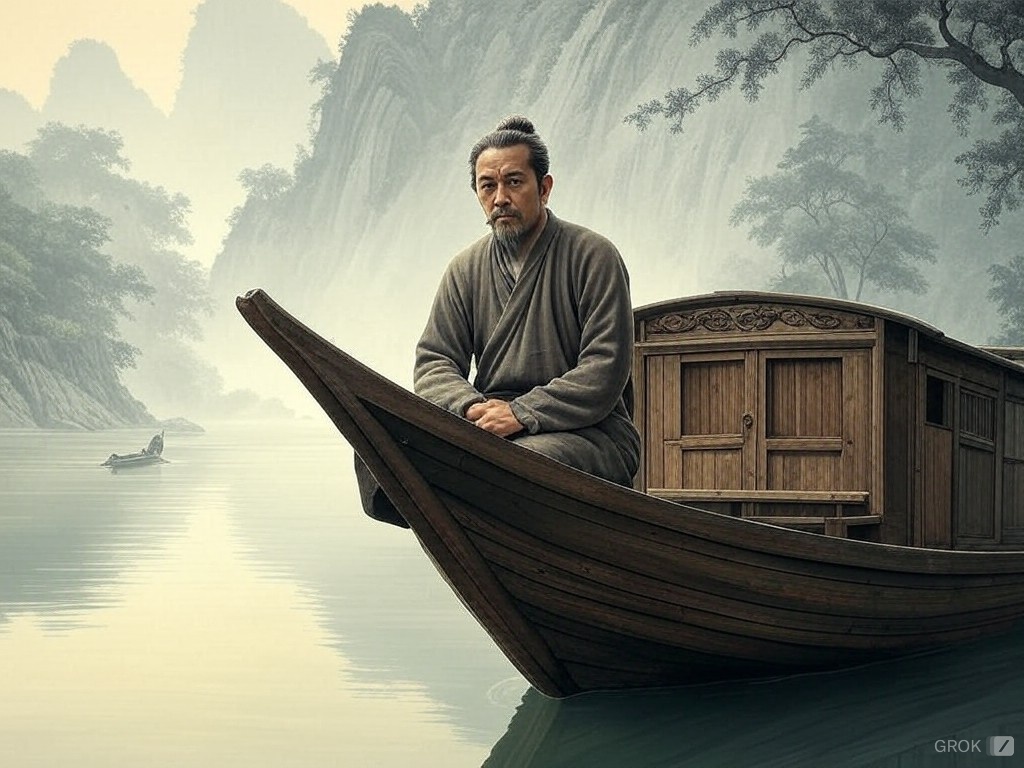"刻舟求剑" (kè zhōu qiú jiàn) - Marking a Boat to Find a Lost Sword

Marking the boat where a sword falls overboard is a futile attempt to retrieve it, for the boat moves on, while the sword remains lost.
Origins and Story
The proverb "刻舟求剑" comes from the Lüshi Chunqiu (吕氏春秋), a classic Chinese text compiled around 239 BCE. The story goes as follows:
A man from the State of Chu was crossing a river by boat. While on the boat, his sword accidentally fell into the water. Instead of trying to retrieve it immediately, he calmly made a mark on the side of the boat where the sword had fallen. He reasoned that when the boat reached the other side, he could simply follow the mark and find his sword.
Upon reaching the shore, he jumped into the water at the marked spot. Of course, the boat had moved, and the river flowed, so the sword was long gone. The man's actions were ridiculed by onlookers, highlighting the foolishness of relying on outdated methods in changing circumstances.
Meaning and Usage
"刻舟求剑" literally translates to "carving a mark on the boat to seek the sword." It is used to describe actions that are foolishly rigid, outdated, and impractical. It criticizes those who cling to old methods and fail to adapt to changing situations.
-
Example (Business): "在瞬息万变的市场中,如果还抱着刻舟求剑的思维做生意,肯定会被淘汰。" (Zài shùnxī wànbiàn de shìchǎng zhōng, rúguǒ hái bàozhe kè zhōu qiú jiàn de sīwéi zuò shēngyì, kěndìng huì bèi táotài.) - "In a rapidly changing market, if one still does business with the mindset of 'marking a boat to find a lost sword,' one will surely be eliminated." This emphasizes the importance of adapting to market changes.
-
Example (Learning): "学习新知识不能刻舟求剑,要根据新的情况调整学习方法。" (Xuéxí xīn zhīshì bù néng kè zhōu qiú jiàn, yào gēnjù xīn de qíngkuàng tiáozhěng xuéxí fāngfǎ.) - "Learning new knowledge should not be like 'marking a boat to find a lost sword'; one should adjust learning methods according to the new situation." This stresses the importance of flexible learning strategies.
-
Example (Problem-Solving): "解决问题不能刻舟求剑,要具体问题具体分析。" (Jiějué wèntí bù néng kè zhōu qiú jiàn, yào jùtǐ wèntí jùtǐ fēnxi.) - "Problem-solving should not be like 'marking a boat to find a lost sword'; one should analyze specific problems specifically." This underscores the need for tailored solutions to different problems.
Cultural Significance of Chéngyǔ (成语)
"刻舟求剑" is a widely known and often-used chéngyǔ in Chinese culture. It serves as a reminder:
- Importance of Adaptability: It emphasizes the necessity of adapting to changing circumstances and avoiding rigid adherence to outdated methods.
- Critical Thinking and Practicality: The proverb promotes critical thinking and encourages practical approaches to problem-solving.
Synonyms and Related Concepts
While there isn't a perfect single-word synonym, several related concepts convey similar ideas:
- 守株待兔 (shǒu zhū dài tù): To guard a tree stump waiting for a rabbit; to wait foolishly for a windfall. This proverb similarly criticizes passive reliance on luck or outdated methods.
- 缘木求鱼 (yuán mù qiú yú): To climb a tree to catch fish; to attempt the impossible. This emphasizes attempting something in a completely wrong way.
Understanding "刻舟求剑" offers valuable insights into Chinese cultural values and the importance of adapting to change. This chéngyǔ effectively conveys the futility of applying outdated methods to new situations.